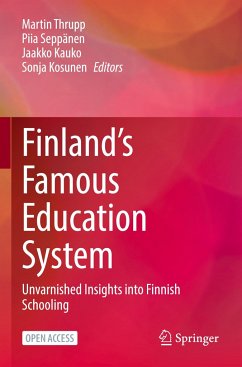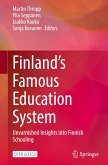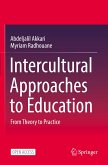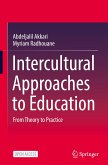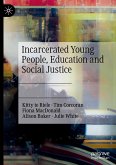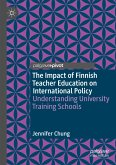Finland¿s Famous Education System
Unvarnished Insights into Finnish Schooling
Herausgegeben:Thrupp, Martin; Seppänen, Piia; Kauko, Jaakko; Kosunen, Sonja
Finland¿s Famous Education System
Unvarnished Insights into Finnish Schooling
Herausgegeben:Thrupp, Martin; Seppänen, Piia; Kauko, Jaakko; Kosunen, Sonja
- Broschiertes Buch
- Merkliste
- Auf die Merkliste
- Bewerten Bewerten
- Teilen
- Produkt teilen
- Produkterinnerung
- Produkterinnerung
This open access book provides academic insights and serves as a platform for research-informed discussion about education in Finland. Bringing together the work of more than 50 authors across 28 chapters, it presents a major collection of critical views of the Finnish education system and topics that cohere around social justice concerns. It questions rhetoric, myths, and commonly held assumptions surrounding Finnish schooling. This book draws on the fields of sociology of education, education policy, urban studies, and policy sociology. It makes use of a range of research methodologies…mehr
Andere Kunden interessierten sich auch für
![Finland¿s Famous Education System Finland¿s Famous Education System]() Finland¿s Famous Education System41,99 €
Finland¿s Famous Education System41,99 €![Intercultural Approaches to Education Intercultural Approaches to Education]() Abdeljalil AkkariIntercultural Approaches to Education33,99 €
Abdeljalil AkkariIntercultural Approaches to Education33,99 €![Intercultural Approaches to Education Intercultural Approaches to Education]() Abdeljalil AkkariIntercultural Approaches to Education41,99 €
Abdeljalil AkkariIntercultural Approaches to Education41,99 €![Globalisation, Values Education and Teaching Democracy Globalisation, Values Education and Teaching Democracy]() Globalisation, Values Education and Teaching Democracy113,99 €
Globalisation, Values Education and Teaching Democracy113,99 €![India Goes to School India Goes to School]() Shivali TukdeoIndia Goes to School105,99 €
Shivali TukdeoIndia Goes to School105,99 €![Incarcerated Young People, Education and Social Justice Incarcerated Young People, Education and Social Justice]() Kitty te RieleIncarcerated Young People, Education and Social Justice89,99 €
Kitty te RieleIncarcerated Young People, Education and Social Justice89,99 €![The Impact of Finnish Teacher Education on International Policy The Impact of Finnish Teacher Education on International Policy]() Jennifer ChungThe Impact of Finnish Teacher Education on International Policy53,99 €
Jennifer ChungThe Impact of Finnish Teacher Education on International Policy53,99 €-
-
-
This open access book provides academic insights and serves as a platform for research-informed discussion about education in Finland. Bringing together the work of more than 50 authors across 28 chapters, it presents a major collection of critical views of the Finnish education system and topics that cohere around social justice concerns. It questions rhetoric, myths, and commonly held assumptions surrounding Finnish schooling.
This book draws on the fields of sociology of education, education policy, urban studies, and policy sociology. It makes use of a range of research methodologies including ethnography, case study and discourse analysis, and references the work of relevant theorists, including Bourdieu and Foucault. This book aims to provide a critical, updated and astute analysis of the strengths and challenges of the Finnish education system.
This book draws on the fields of sociology of education, education policy, urban studies, and policy sociology. It makes use of a range of research methodologies including ethnography, case study and discourse analysis, and references the work of relevant theorists, including Bourdieu and Foucault. This book aims to provide a critical, updated and astute analysis of the strengths and challenges of the Finnish education system.
Produktdetails
- Produktdetails
- Verlag: Springer / Springer Nature Singapore / Springer, Berlin / Tampere University Foundation sr / Univers
- Artikelnr. des Verlages: 978-981-19-8243-9
- 1st ed. 2023
- Seitenzahl: 484
- Erscheinungstermin: 2. März 2023
- Englisch
- Abmessung: 235mm x 155mm x 27mm
- Gewicht: 727g
- ISBN-13: 9789811982439
- ISBN-10: 9811982430
- Artikelnr.: 66203708
- Herstellerkennzeichnung
- Books on Demand GmbH
- In de Tarpen 42
- 22848 Norderstedt
- info@bod.de
- 040 53433511
- Verlag: Springer / Springer Nature Singapore / Springer, Berlin / Tampere University Foundation sr / Univers
- Artikelnr. des Verlages: 978-981-19-8243-9
- 1st ed. 2023
- Seitenzahl: 484
- Erscheinungstermin: 2. März 2023
- Englisch
- Abmessung: 235mm x 155mm x 27mm
- Gewicht: 727g
- ISBN-13: 9789811982439
- ISBN-10: 9811982430
- Artikelnr.: 66203708
- Herstellerkennzeichnung
- Books on Demand GmbH
- In de Tarpen 42
- 22848 Norderstedt
- info@bod.de
- 040 53433511
Martin Thrupp has been Professor of Education at the University of Waikato in New Zealand since 2006. Prior to that, he held posts at King's College London and the Institute of Education, University of London. Thrupp has also worked in Finnish education circles since 2016, including visits to Finland in all four seasons. His research interests are in education policy, with a particular focus on school reform as it plays out in different local and national settings. He has authored a number of books, including 'The Search for Better Educational Standards: A Cautionary Tale' (Springer, 2018), and has also co-edited collections about New Zealand's education system published in 2010 and 2019. Piia Seppänen is Professor of Education, especially on comparative education and education policy at the University of Turku in Finland where she also works as Vice-Dean for research in its Faculty of Education. Her research with research groups at the Centre for Research on Lifelong Learning and Education (CELE) focuses on pupil selection, urban social segregation, and classed practices within comprehensive schooling. Seppänen also studies commodification in public education systems and its connections to the global education industry. Jaakko Kauko is Professor of Education Policy at the Faculty of Education and Culture, Tampere University, Finland. His research focuses on the fields of education policy and comparative education, and he has recently been researching transnational knowledge networks in higher education. Kauko is co-author of Dynamics in Education Politics: Understanding and Explaining the Finnish Case with Hannu Simola, Janne Varjo, Mira Kalalahti, and Fritjof Sahlström (Routledge, 2017), and co-editor of Successful Public Policy in the Nordic Countries: Cases, Lessons, Challenges with Caroline de la Porte, Guðný Björk Eydal, Daniel Nohrstedt, Paul 't Hart, and Bent Sofus Tranøy (Oxford University Press, 2022). Sonja Kosunen is Associate Professor of Education at the University of Helsinki, Finland. She is the leader of the research unit Social studies in Urban Education (SURE), which studies phenomena related to social justice, reproduction and inequalities in education from pre-primary through to higher education. Kosunen's current research focuses on the stratification of the teaching profession, segregation of teachers, and the (re)production of class-based inequalities in segregated education markets.
Introduction.- Part 1: Politics, policy, teachers and edu-business.- Municipal governance of comprehensive education: The emergence of local universalisms.- Finland's ministry of education and culture in the light of its working groups.- A progressive force in Finnish schooling?: Finland's education union, OAJ and its influence on school-level education policy.- Finnish quality evaluation discourse: Swimming against the global tide?.- Ecological sustainability and steering of Finnish comprehensive schools.- Unmentioned challenges of Finnish teacher education: Decontextualisation, scientification and the rhetoric of the research-based agenda.- Teachers' expectations and expectations of teachers: Understanding teachers' societal role.- Businessing around comprehensive schooling.- Co-operation of edu-business and public schooling: Is the governance of education in Finland shifting from the public sector to networks?- Part 2: Equity, inequality, and the challenges of diversity, language and inclusion.- "Three bedrooms and a nice school" - Residential choices, school choices and vicious circles of segregation in the education landscape of Finnish cities.- Pupil selection and enrolment in comprehensive schools in urban Finland.- Everyday life in schools in disadvantaged areas.- Divided cities - Divided schools? School segregation and the role of needs-based resource allocation in Finland.- The significance of socioeconomic background for the educational dispositions and aspirations of Finnish school leavers.- Controversies and challenges in the history of gender discourses in education in Finland.- Rainbow paradise? Sexualities and gender diversity in Finnish schools.- Racism in Finnish school textbooks: Developments and discussions.- Saami language online education outside the Saami homeland - New pathways to social justice.- Education of pupils with migrant backgrounds: A systemic failure in the Finnish system?.- Negotiated, given and self-made paths: Immigrant origin girls and post-compulsory educational transition in Finland.- Language education for everyone? Busting access myths.- Rethinking Finland's official bilingualism in education.- Religions and worldviews as "the problem" in Finnish schools.- Inclusion in Finland: Myths and realities.- Exclusively included? Finland's inclusion success story and hidden dual system of mainstream and special needs education.- Student disengagement in Finnish comprehensive schooling.- Part 3: Epilogue.- The Foundations of Critical Studies in Education in Finland.
Introduction.- Part 1: Politics, policy, teachers and edu-business.- Municipal governance of comprehensive education: The emergence of local universalisms.- Finland's ministry of education and culture in the light of its working groups.- A progressive force in Finnish schooling?: Finland's education union, OAJ and its influence on school-level education policy.- Finnish quality evaluation discourse: Swimming against the global tide?.- Ecological sustainability and steering of Finnish comprehensive schools.- Unmentioned challenges of Finnish teacher education: Decontextualisation, scientification and the rhetoric of the research-based agenda.- Teachers' expectations and expectations of teachers: Understanding teachers' societal role.- Businessing around comprehensive schooling.- Co-operation of edu-business and public schooling: Is the governance of education in Finland shifting from the public sector to networks?- Part 2: Equity, inequality, and the challenges of diversity, language and inclusion.- "Three bedrooms and a nice school" - Residential choices, school choices and vicious circles of segregation in the education landscape of Finnish cities.- Pupil selection and enrolment in comprehensive schools in urban Finland.- Everyday life in schools in disadvantaged areas.- Divided cities - Divided schools? School segregation and the role of needs-based resource allocation in Finland.- The significance of socioeconomic background for the educational dispositions and aspirations of Finnish school leavers.- Controversies and challenges in the history of gender discourses in education in Finland.- Rainbow paradise? Sexualities and gender diversity in Finnish schools.- Racism in Finnish school textbooks: Developments and discussions.- Saami language online education outside the Saami homeland - New pathways to social justice.- Education of pupils with migrant backgrounds: A systemic failure in the Finnish system?.- Negotiated, given and self-made paths: Immigrant origin girls and post-compulsory educational transition in Finland.- Language education for everyone? Busting access myths.- Rethinking Finland's official bilingualism in education.- Religions and worldviews as "the problem" in Finnish schools.- Inclusion in Finland: Myths and realities.- Exclusively included? Finland's inclusion success story and hidden dual system of mainstream and special needs education.- Student disengagement in Finnish comprehensive schooling.- Part 3: Epilogue.- The Foundations of Critical Studies in Education in Finland.

